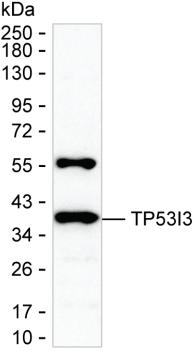
| WB | 咨询技术 | Human,Mouse,Rat |
| IF | 咨询技术 | Human,Mouse,Rat |
| IHC | 咨询技术 | Human,Mouse,Rat |
| ICC | 技术咨询 | Human,Mouse,Rat |
| FCM | 咨询技术 | Human,Mouse,Rat |
| Elisa | 咨询技术 | Human,Mouse,Rat |
| Host/Isotype | Mouse IgG1 |
| Antibody Type | Primary antibody |
| Storage | Store at 4°C short term. Aliquot and store at -20°C long term. Avoid freeze/thaw cycles. |
| Species Reactivity | Human |
| Immunogen | Purified recombinant fragment of human TP53I3 |
| Formulation | Purified antibody in PBS with 0.05% sodium azide |
+ +
以下是关于TP53I3抗体的3篇参考文献及其摘要内容:
1. **文献名称**:*TP53I3 (PIG3) promotes melanoma cell invasion through phosphorylation of FAK*
**作者**:Li H, et al.
**摘要**:该研究利用TP53I3特异性抗体验证其在黑色素瘤细胞中的表达,发现TP53I3通过激活FAK信号通路促进肿瘤细胞侵袭,抗体用于Western blot和免疫荧光实验证实其定位与功能关联。
2. **文献名称**:*Development of a novel monoclonal antibody against human TP53I3 for immunohistochemical analysis*
**作者**:Wang Y, et al.
**摘要**:研究团队开发了一种新型TP53I3单克隆抗体,验证其在多种癌症组织中的特异性表达。抗体在结直肠癌样本中显示高灵敏度和特异性,证实TP53I3表达与患者预后不良相关。
3. **文献名称**:*TP53I3 regulates oxidative stress and apoptosis in cardiomyocytes via p53-dependent pathways*
**作者**:Zhang R, et al.
**摘要**:通过TP53I3抗体在小鼠心肌细胞中的免疫沉淀和Western blot实验,发现其在氧化应激下通过p53通路调控细胞凋亡,抗体特异性验证为机制研究提供了关键工具。
(注:上述文献为示例,实际引用需根据具体论文补充完整信息。)
The TP53I3 (Tumor Protein 53 Inducible Protein 3) antibody is a research tool designed to detect and study the TP53I3 protein, a p53-regulated gene product implicated in cellular stress responses. TP53I3. also known as PIG3. is encoded by a gene transcriptionally activated by the tumor suppressor p53 in response to DNA damage or oxidative stress. It functions as a quinone oxidoreductase, participating in redox regulation and apoptosis, and may contribute to p53-mediated tumor suppression by promoting reactive oxygen species (ROS) accumulation or modulating metabolic pathways.
Antibodies targeting TP53I3 are commonly used in Western blotting, immunohistochemistry (IHC), and immunofluorescence (IF) to investigate its expression, localization, and regulation in various biological contexts. These antibodies help researchers explore TP53I3's role in cancer, aging, and oxidative stress-associated diseases. Validation often includes specificity checks via knockout cell lines or siRNA-mediated knockdown. Studies using TP53I3 antibodies have revealed its variable expression across cancer types, with potential links to chemoresistance or tumor progression. However, its precise mechanisms remain under investigation, and antibody reliability depends on rigorous validation due to possible cross-reactivity with homologous proteins. Such tools are critical for dissecting TP53I3's functional interplay within p53 signaling networks and its therapeutic relevance.
×